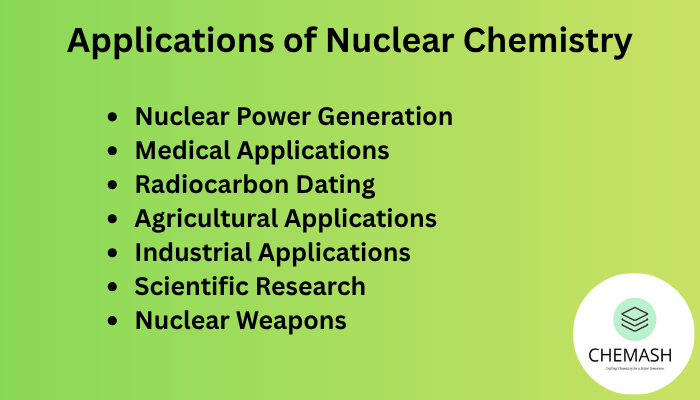Applications of Nuclear Chemistry
Nuclear chemistry is a powerful branch of science that explores atomic nuclei and their transformations. Its real-world applications impact energy, medicine, agriculture, industry, and scientific research.

1. Nuclear Power Generation
Nuclear fission, particularly using Uranium-235, is a clean method of energy production. Therefore, nuclear reactors contribute to electricity generation without greenhouse gas emissions.
Example: One uranium pellet provides as much energy as one ton of coal!
2. Medical Applications
- Technetium-99m → Organ imaging (used in 80%+ nuclear scans)
- Fluorine-18 → PET scans for cancer detection
- Iodine-131 → Thyroid treatment
- Cobalt-60 → Cancer radiotherapy
3. Radiocarbon Dating
Uses Carbon-14 to determine the age of ancient organic matter (up to 50,000 years).
4. Agricultural Applications
- Mutation breeding: Radiation induces useful plant mutations.
- Food sterilization: Gamma rays preserve food and extend shelf life.
5. Industrial Applications
- Radiography: Inspect welds without destruction.
- Thickness measurement: Beta rays measure material thickness.
6. Scientific Research
Radioisotopes act as tracers in biology and chemistry. Essential for discovering new elements and isotopic studies.
7. Nuclear Weapons
Uncontrolled nuclear fission/fusion for massive explosions. Raises ethical, environmental, and global concerns.
Multiple Choice Questions (MCQs)
- Which isotope is commonly used in thyroid treatments?
A. Carbon-14 B. Iodine-131 ✔️ C. Uranium-238 D. Cobalt-60
Explanation: Iodine-131 is selectively absorbed by the thyroid and is used to treat thyroid-related issues. - Which of the following is used in PET scans?
A. Fluorine-18 ✔️ B. Technetium-99m C. Iodine-131 D. Thorium-232
Explanation: Fluorine-18 is a positron emitter used in PET (Positron Emission Tomography). - Which process is used in nuclear power generation?
A. Fusion B. Combustion C. Fission ✔️ D. Oxidation
Explanation: Nuclear fission is the controlled splitting of atomic nuclei to release energy.
True/False Questions
- Technetium-99m is used in cancer therapy. – ❌
False. It is primarily used for diagnostic imaging, not treatment. - Radiocarbon dating can date rocks billions of years old. – ❌
False. Carbon-14 dating is only effective up to ~50,000 years. - Nuclear fission releases large amounts of energy. – ✔️
True. It is the process behind nuclear power and atomic bombs.
Quick Quiz
Q: What is the role of Cobalt-60 in medicine?
- Used in X-ray machines
- Used in chemotherapy
- Used in radiotherapy ✔️
- Used as anesthesia
Answer: Cobalt-60 is used in external beam radiotherapy to treat cancer.
FAQs – Applications of Nuclear Chemistry
Q1: What is nuclear chemistry used for?
A: It is used in power generation, medicine, archaeology (dating), agriculture, and research.
Q2: Which isotope is used in cancer treatment?
A: Cobalt-60 is commonly used for radiotherapy in cancer treatment.
Q3: Is nuclear power environmentally friendly?
A: Yes, it produces no greenhouse gases, though radioactive waste must be managed properly.
